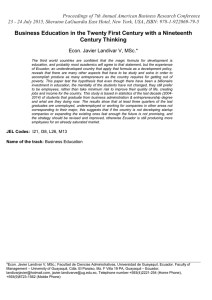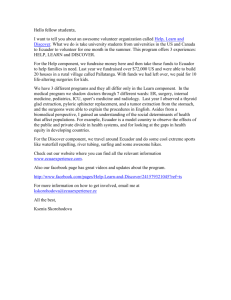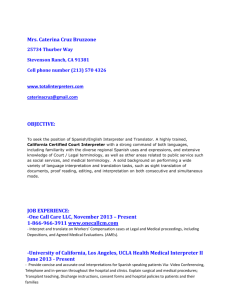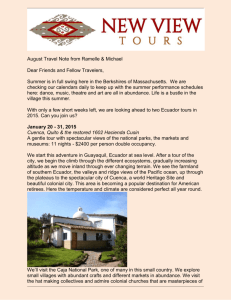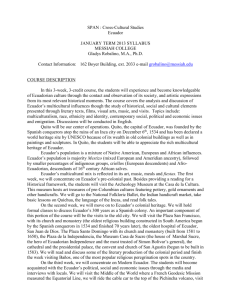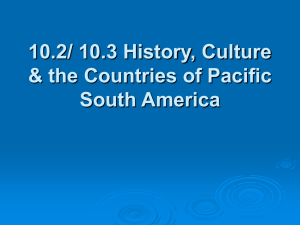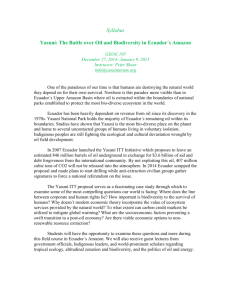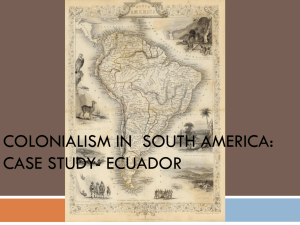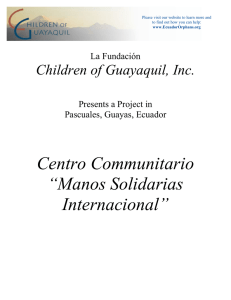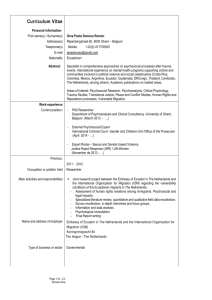Read Emily`s report here - The Bixby Center for Population, Health
advertisement
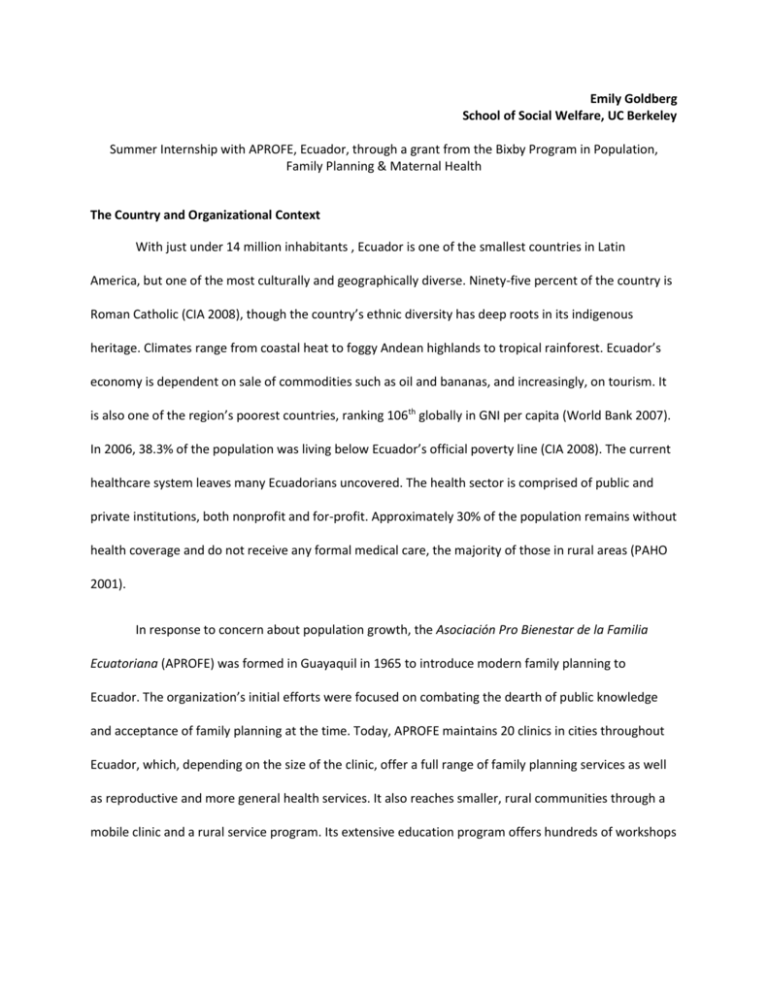
Emily Goldberg School of Social Welfare, UC Berkeley Summer Internship with APROFE, Ecuador, through a grant from the Bixby Program in Population, Family Planning & Maternal Health The Country and Organizational Context With just under 14 million inhabitants , Ecuador is one of the smallest countries in Latin America, but one of the most culturally and geographically diverse. Ninety-five percent of the country is Roman Catholic (CIA 2008), though the country’s ethnic diversity has deep roots in its indigenous heritage. Climates range from coastal heat to foggy Andean highlands to tropical rainforest. Ecuador’s economy is dependent on sale of commodities such as oil and bananas, and increasingly, on tourism. It is also one of the region’s poorest countries, ranking 106th globally in GNI per capita (World Bank 2007). In 2006, 38.3% of the population was living below Ecuador’s official poverty line (CIA 2008). The current healthcare system leaves many Ecuadorians uncovered. The health sector is comprised of public and private institutions, both nonprofit and for-profit. Approximately 30% of the population remains without health coverage and do not receive any formal medical care, the majority of those in rural areas (PAHO 2001). In response to concern about population growth, the Asociación Pro Bienestar de la Familia Ecuatoriana (APROFE) was formed in Guayaquil in 1965 to introduce modern family planning to Ecuador. The organization’s initial efforts were focused on combating the dearth of public knowledge and acceptance of family planning at the time. Today, APROFE maintains 20 clinics in cities throughout Ecuador, which, depending on the size of the clinic, offer a full range of family planning services as well as reproductive and more general health services. It also reaches smaller, rural communities through a mobile clinic and a rural service program. Its extensive education program offers hundreds of workshops and lectures each year for age- and gender-specific groups, on topics ranging from family planning and sexual education to HIV/AIDS prevention, drug abuse, and domestic violence. From the 1970’s to the 1990’s, APROFE received the bulk of its financial support from USAID and the International Planned Parenthood Federation (IPPF). By 1995, it became clear that these donors would be significantly decreasing their support. For reasons of economic survival, APROFE has concentrated on increasing its income by increasing its number of clients while trying to keep unavoidable fee increases to a minimum. Ecuador suffered an acute economic crisis in 2000, making APROFE’s push for sustainablility especially challenging. Despite efforts to keep fees affordable, without health-sector reform that guarantees universal access, the need to attract large numbers of paying clients has changed its client profile. This change is described in an APROFE doctor’s comments: Before, the users were very poor people, because APROFE served people for practically nothing and gave contraceptives free. When we lost our financial support, APROFE had to begin to cover its costs and we raised our fees. As a result, all of our former clients have slipped away. Now we have a different type of user, the newly impoverished middle class- bank workers, secretaries, etc.,- and we no longer serve poor users from urban slums (Shepard 2004). Families that formerly sought private care now use APROFE services, and some poor clients are now unable to afford APROFE services and products. This means their urban clientele is drawn from a higher, though still modest, income group. APROFE’s push toward self-sufficiency has been successful. The organization currently receives no support from USAID or IPPF and survives mainly on service fees. Work Activities I worked at APROFE’s main center in Guayaquil, a western city of 2,000,000 people. I participated in two areas of the organization: the Adolescent Program and the Rural Service Program. The Adolescent Program began in 1990 as a response to the growing number of youth visiting APROFE clinics, coupled with increasing cases of sexual and reproductive health problems among youth. The Adolescent Program is based at the main center in Guayaquil. There is a reproductive health clinic at the center with a private entrance for youth and their families. In addition to services such as contraception planning and diagnosis and treatment of STDs, psychologists are available during clinic hours for group and individual counseling. Education and outreach is another important aspect of the program. Most of my work involved traveling to schools in Guayaquil to give presentations to classrooms on the services offered by APROFE, in order to increase awareness of the teen clinic and youths’ reproductive health rights. When requested, the organization also sends representatives to provide workshops on particular issues such as HIV/AIDS, birth control methods, and self-esteem. A peer outreach component trains high school and college students in sexual and reproductive health issues, and these volunteer workers help conduct the workshops mentioned above. In order to both recruit youth as outreach workers, and provide after-school activities that encourage healthy use of adolescents’ free time, APROFE provides various classes and activities at the Guayaquil center. As part of that program, I taught an English language class for one month, which was open to youth who were training to become outreach workers. The other half of my time with APROFE was spent with the Rural Service Program. The primary work of this program is to provide health and family planning services to rural or isolated communities who otherwise have very limited access to healthcare. Additionally, APROFE has offered informational talks on health, vocational training in rural areas and a female prison in Guayaquil, as well as other community support projects. Such projects have included latrine building and an innovative artist-inresidence program on an island with a community of people who are generally very poor and isolated from outside services. The Rural Service Program is supported by small grants, funds from urban clinic fees, and through donations of medicine. A common complaint among doctors with the program was that APROFE was only able to provide medicine that was in stock, to rural patients. If they did not have a particular medicine that was needed, the doctors would write a prescription, but patients rarely had enough money to pay for the medicine at a pharmacy. My time with the Rural Service Program was spent observing and learning through interacting with the health workers and communities. Challenges Many APROFE staff members I spoke with maintained that family planning work in a predominantly Catholic country comes with inherent challenges. I experienced some such challenges while visiting schools with APROFE. While the schools’ administration always approved APROFE’s visits, at each school there were at least one or two teachers or staff who vocally opposed APROFE’s presentations. At two schools, we were actually forced to leave early because of tension between APROFE and school staff due to the content of the presentations. These outspoken teachers did not generally seem to believe that birth control should never be used, but that information about sex and birth control methods would encourage the youth to engage in sexual activity, and therefore they opposed the presenting of such information. While I have worked with youth with different cultural backgrounds, as well as Spanish speaking youth, I was nonetheless nervous about working with youth on family planning issues in a country whose views on family planning and culture as related to sex were basically unknown to me. In fact, working with Ecuadorian youth turned out to be no more or less challenging than working with American youth and I found most teenagers to be very open to sexual education and learning about their reproductive rights, and the youth outreach workers to be dedicated and excellent teachers. Another challenge for me in working with APROFE was related to my differing beliefs in contrast to some of those held by the organization, primarily related to the issue of abortion. In Ecuador, abortion is illegal in almost all cases. Still, I naively assumed that APROFE would be involved in a fight to legalize abortion in the country. Instead, the director informed me that the organization had actually stopped accepting IPPF funds due to their differing positions on abortion. APROFE officially takes a neutral stance on abortion, but chooses not to affiliate with organizations or doctors that support its legalization. While it was initially difficult for me to separate abortion rights from my conception of family planning work, I nonetheless developed a great respect for APROFE, as a truly pioneering organization in the area of family planning in Ecuador. Finally, the fact that APROFE no longer serves the poorest and those with the least access to health services in urban areas was frustrating for me. While a number of staff members and doctors also expressed their frustration about this to me, most believed that increasing fees was the only way for the organization to survive. Still, it was difficult for me to understand the directors’ decision to stop accepting IPPF funds, when accepting those funds might enable the organization to provide at least somewhat greater access to services to those with the greatest need. But despite the challenges that come with not accepting financial support from government and some private organizations, there are obviously benefits of becoming a fully self-sustaining organization. And through APROFE’s innovative strategies of diversifying services, increasing marketing activities, improving quality of care, and focusing on program evaluation, the organization has impressively survived against a number of odds. References Central Intelligence Agency (CIA) (2008). The World Factbook: Ecuador. Retrieved August 20, 2008, from www.cia.gov/library/publications/the-world-factbook/print/ec.html. Marangoni, P, Green, R, & Greig, F (2000). NGOs providing low cost, high quality family planning and reproductive health services. Case study: APROFE- Ecuador. Retrieved June 1, 2008, from big.berkeley.edu/APROFE.pdf. Pan American Health Organization (PAHO) (2001). Country Health Profile: Ecuador. Retrieved August 20, 2008, from www.paho.org/English/sha/prflecu.htm. Shepard, B. L. (2004). Addressing gender issues with men and couples: Involving men in sexual and reproductive health services in APROFE, Ecuador. International Journal of Men’s Health, 3(3), 155-172. World Bank (2007). Gross National Income Per Capita: Ecuador. Retrieved August 20, 2008, from http://siteresources/worldbank.org/DATASTATISTICS/Resources/GNIPC.pdf. Emily Goldberg School of Social Welfare, UC Berkeley Summer Internship with APROFE, Ecuador, through a grant from the Bixby Program in Population, Family Planning & Maternal Health I spent the summer working with APROFE, a family planning organization founded in Ecuador in 1965. Today, APROFE maintains 20 clinics in cities throughout Ecuador, a rural service program, and extensive adult and youth education programs. I worked primarily with the Adolescent Program, traveling to schools to give presentations to students on the services offered by APROFE, in order to increase awareness of the organization’s teen clinic and youths’ reproductive health rights. I also helped run after-school activities for youth outreach workers at APROFE’s main center. My internship with APROFE provided me the valuable experience of working with youth on family planning issues in a different cultural and linguistic context. In addition, due to APROFE’s push toward self-sufficiency, I learned about the challenges for nonprofit organizations of maintaining selfsufficiency while fulfilling mission and staying true to organizational values and beliefs.
